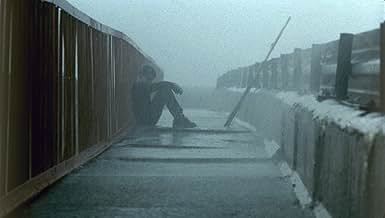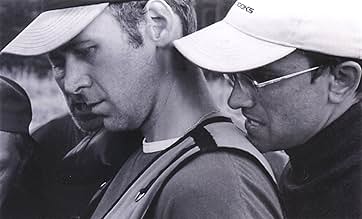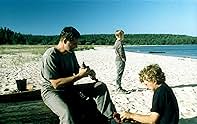IMDb रेटिंग
7.9/10
48 हज़ार
आपकी रेटिंग
रूसी वीराने में, दो भाई नई और परस्पर विरोधी भावनाओं का सामना करते हैं जब उनके पिता, एक ऐसा व्यक्ति जिसे वे केवल एक तस्वीर के माध्यम से ही जानते हैं वह प्रकट हो जाते हैं.रूसी वीराने में, दो भाई नई और परस्पर विरोधी भावनाओं का सामना करते हैं जब उनके पिता, एक ऐसा व्यक्ति जिसे वे केवल एक तस्वीर के माध्यम से ही जानते हैं वह प्रकट हो जाते हैं.रूसी वीराने में, दो भाई नई और परस्पर विरोधी भावनाओं का सामना करते हैं जब उनके पिता, एक ऐसा व्यक्ति जिसे वे केवल एक तस्वीर के माध्यम से ही जानते हैं वह प्रकट हो जाते हैं.
- पुरस्कार
- 33 जीत और 20 नामांकन
कहानी
क्या आपको पता है
- ट्रिवियाWhen pre-production was starting, director Andrey Zvyagintsev told producer Dmitry Lesnevsky there was no point in making the film if they couldn't find two boys who were "actors of genius." Zvyagintsev had two assistants who helped him look for actors, one in St. Petersburg and one in Moscow, and visited both cities himself. He found Vladimir Garin in St. Petersburg and Ivan Dobronravov in Moscow, picking them from over 600 contenders.
- गूफ़When Ivan is sitting in the car, the camera pans around the car (before we see him grab the binoculars and begin to use them) - as it pans past the triangular car window you can see the camera reflected in it.
- कनेक्शनFeatured in Namedni 1961-2003: Nasha Era: Namedni 2003 (2003)
- साउंडट्रैकRequiem in re minore K626
by Wolfgang Amadeus Mozart
फीचर्ड रिव्यू
"The Return," a breathtakingly austere masterpiece from the land that gave us Eisenstein, Pudovkin and Tarkovsky, is one of the most beautifully acted and directed films I have seen in years. Astonishingly enough, this is the feature film debut for director Andrei Zvyagintsev who demonstrates more of a mastery and command of the medium in this his maiden effort than most directors do in a whole body of work.
The film tells the tale of two brothers, Ivan and Andrei, who live with their mother and grandmother in a small coastal village in Russia. One day, totally unexpectedly, the boys' father returns after a twelve-year absence. In an effort to make up for lost time, the dad decides to take his sons on a fishing trip, but, almost immediately, he begins to demonstrate disturbing tendencies towards domination and abuse. He also appears to be up to some sort of nefarious business operations to which neither we nor the boys are entirely privy.
Every single moment of this film is a revelation. Zvyagintsev beautifully captures the opposite ways in which the boys react to and interact with their father. Andrei, the oldest, is so desperate for a father figure in his life that he is willing to overlook the often inexplicable, bizarre and possibly even dangerous behavior that this particular father exhibits. Ivan, on the other hand, embittered by years of absence and neglect, seethes with barely disguised rage at the man who now presumes to enter into their once happy lives and assert his authority. Of the two boys, he seems the most tuned into the kind of threat the father may pose to their welfare. Yet, towards the end of the story, the apparently latent love the boy feels for this man as his father does eventually rise to the surface. Through this intense interaction, the film emerges as a complex and profound study of what father and son relationships are really all about.
It is virtually impossible to put into words just how brilliantly the two young actors use their facial expressions to convey a wealth of meaning and emotion. As portrayed by Vladimir Garin, Andrey looks up to his father with a mixture of boyish pride and trembling awe, longing for the kind of male affirmation he has been deprived of all these years. He is desperate to please his father by proving to him that he can perform the acts of manhood that his dad keeps putting forth for him to do. As Ivan, Ivan Dobronravov spends most of his time glaring at the man, his mouth pursed in a tight unyielding grimace of resentment and hate. If I could give an award for the best performance by a child actor in movie history, these two youngsters would be high on my list of candidates. They are that amazing. Tragically, young Garin drowned two months prior to the release of the film, leaving his indelible mark behind in a performance that will never be forgotten by anyone privileged enough to witness it. Konstantin Lavronenko is equally impressive as the boy's mysterious father, beautifully underplaying the part of a man who can appear sane and rational on the surface but who is a seething cauldron of untapped emotions beneath. In fact, it is this constant threat of violence always on the verge of eruption that keeps us off balance and on edge throughout the entire picture.
The film's writers, Vladimir Moiseyenko and Aleksandr Novotosky, deserve special recognition for not allowing the plot to overwhelm the characters. For this is, first and foremost, a great character study. The scenarists have intentionally left the background of the father vague and sketchy, the better to enhance the sense of mystery and danger he represents. We never find out what nefarious activities he is involved with since that is of virtually no importance either to the children or to us. We are too engrossed in the relationships of the characters to care. In fact, there are a few hints towards the end of the film that this seemingly cold, uncaring man, for all his myriad faults, might actually just love his sons in his own strange way. The film leaves us with no easy answers or pat resolutions at the end. And this is how it should be. In fact, the scriptwriters even throw a few of Hitchcock's prized "MacGuffins" into the mix to keep us off balance (there is a scene in which some possibly stolen money sinks to the bottom of a lake that is highly reminiscent of what happens in "Psycho")..
Among other things, "The Return" represents one of the most impressive directorial debuts since Francois Truffaut's "The 400 Blows." Zvyagintsev's ability to draw great performances from his actors is only one of his many talents on display here. His lyrical use of composition, as well as the way in which he makes nature and weather an integral part of his drama help to draw us so deeply into this world that it takes the viewer literally hours to get fully back to his own existence again once the movie has ended. It reverberates for days afterwards. For as with any great film, "The Return" finds its way into the depths of one's soul and leaves the viewer a richer person for the experience.
Winner of the Silver Lion at the Venice Film Festival (2003), "The Return" is a true work of art and one of the outstanding films of the decade so far. Whatever you do, don't miss this film.
The film tells the tale of two brothers, Ivan and Andrei, who live with their mother and grandmother in a small coastal village in Russia. One day, totally unexpectedly, the boys' father returns after a twelve-year absence. In an effort to make up for lost time, the dad decides to take his sons on a fishing trip, but, almost immediately, he begins to demonstrate disturbing tendencies towards domination and abuse. He also appears to be up to some sort of nefarious business operations to which neither we nor the boys are entirely privy.
Every single moment of this film is a revelation. Zvyagintsev beautifully captures the opposite ways in which the boys react to and interact with their father. Andrei, the oldest, is so desperate for a father figure in his life that he is willing to overlook the often inexplicable, bizarre and possibly even dangerous behavior that this particular father exhibits. Ivan, on the other hand, embittered by years of absence and neglect, seethes with barely disguised rage at the man who now presumes to enter into their once happy lives and assert his authority. Of the two boys, he seems the most tuned into the kind of threat the father may pose to their welfare. Yet, towards the end of the story, the apparently latent love the boy feels for this man as his father does eventually rise to the surface. Through this intense interaction, the film emerges as a complex and profound study of what father and son relationships are really all about.
It is virtually impossible to put into words just how brilliantly the two young actors use their facial expressions to convey a wealth of meaning and emotion. As portrayed by Vladimir Garin, Andrey looks up to his father with a mixture of boyish pride and trembling awe, longing for the kind of male affirmation he has been deprived of all these years. He is desperate to please his father by proving to him that he can perform the acts of manhood that his dad keeps putting forth for him to do. As Ivan, Ivan Dobronravov spends most of his time glaring at the man, his mouth pursed in a tight unyielding grimace of resentment and hate. If I could give an award for the best performance by a child actor in movie history, these two youngsters would be high on my list of candidates. They are that amazing. Tragically, young Garin drowned two months prior to the release of the film, leaving his indelible mark behind in a performance that will never be forgotten by anyone privileged enough to witness it. Konstantin Lavronenko is equally impressive as the boy's mysterious father, beautifully underplaying the part of a man who can appear sane and rational on the surface but who is a seething cauldron of untapped emotions beneath. In fact, it is this constant threat of violence always on the verge of eruption that keeps us off balance and on edge throughout the entire picture.
The film's writers, Vladimir Moiseyenko and Aleksandr Novotosky, deserve special recognition for not allowing the plot to overwhelm the characters. For this is, first and foremost, a great character study. The scenarists have intentionally left the background of the father vague and sketchy, the better to enhance the sense of mystery and danger he represents. We never find out what nefarious activities he is involved with since that is of virtually no importance either to the children or to us. We are too engrossed in the relationships of the characters to care. In fact, there are a few hints towards the end of the film that this seemingly cold, uncaring man, for all his myriad faults, might actually just love his sons in his own strange way. The film leaves us with no easy answers or pat resolutions at the end. And this is how it should be. In fact, the scriptwriters even throw a few of Hitchcock's prized "MacGuffins" into the mix to keep us off balance (there is a scene in which some possibly stolen money sinks to the bottom of a lake that is highly reminiscent of what happens in "Psycho")..
Among other things, "The Return" represents one of the most impressive directorial debuts since Francois Truffaut's "The 400 Blows." Zvyagintsev's ability to draw great performances from his actors is only one of his many talents on display here. His lyrical use of composition, as well as the way in which he makes nature and weather an integral part of his drama help to draw us so deeply into this world that it takes the viewer literally hours to get fully back to his own existence again once the movie has ended. It reverberates for days afterwards. For as with any great film, "The Return" finds its way into the depths of one's soul and leaves the viewer a richer person for the experience.
Winner of the Silver Lion at the Venice Film Festival (2003), "The Return" is a true work of art and one of the outstanding films of the decade so far. Whatever you do, don't miss this film.
टॉप पसंद
रेटिंग देने के लिए साइन-इन करें और वैयक्तिकृत सुझावों के लिए वॉचलिस्ट करें
विवरण
बॉक्स ऑफ़िस
- US और कनाडा में सकल
- $5,04,256
- US और कनाडा में पहले सप्ताह में कुल कमाई
- $19,795
- 8 फ़र॰ 2004
- दुनिया भर में सकल
- $84,82,993
- चलने की अवधि1 घंटा 50 मिनट
- रंग
- ध्वनि मिश्रण
- पक्ष अनुपात
- 1.85 : 1
इस पेज में योगदान दें
किसी बदलाव का सुझाव दें या अनुपलब्ध कॉन्टेंट जोड़ें























